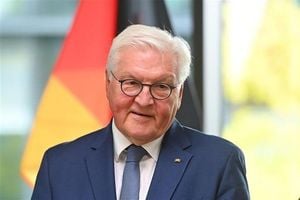In a significant diplomatic maneuver, Thai Prime Minister Paethongtarn Shinawatra has revealed that Thailand is engaged in ongoing negotiations regarding the contentious U.S. tariff barriers. Speaking on May 4, 2025, during the program "Opportunities for Thailand with Prime Minister Paethongtarn," he disclosed that secret deals are being discussed, although he could not provide specific details. This comes amid rising concerns about the impact of the tariffs, which currently stand at a staggering 36% on Thai imports to the United States.
The Prime Minister emphasized the importance of a united ASEAN front in these negotiations, suggesting that collective bargaining power could enhance Thailand's position. He stated, "I have been in constant communication with Deputy Prime Minister Phichai Chunhawachira on this matter." The ongoing discussions aim to clarify when Thailand can officially present its case to the U.S., but as of now, no timeline has been established.
While the Thai government remains optimistic about potential tariff reductions, many stakeholders are keenly watching how these discussions unfold. The impact of the tariffs on Thai businesses is a pressing concern, as the current rate significantly affects the competitiveness of Thai goods in the U.S. market. Deputy Prime Minister Chunhawachira expressed confidence that the U.S. would not impose the full 36% tariff, stating, "We must wait for negotiations to conclude, as we are still in the process of determining which essential goods to import, such as corn, at acceptable prices to balance trade."
Thailand's agricultural sector, particularly its food processing capabilities, is at the forefront of this discussion. Currently, the country operates at only 60-70% of its production capacity, raising questions about how to optimize resources. If Thailand can import raw materials at favorable rates, it could stimulate production and enhance export opportunities. Chunhawachira noted, "If we must import goods from the U.S. to lower the tariff barriers, we should also consider other raw materials that can be processed to add value. This creates a win-win situation for both parties."
In a related development, there have been rumors of a secret deal involving the release of a U.S. scholar in exchange for tariff concessions. However, Deputy Prime Minister Phumtham Wechayachai has denied these claims, asserting that they are unfounded. The Thai government is focused on legitimate negotiations rather than speculative agreements.
As the situation develops, the Thai government is also looking to strengthen ties with other ASEAN nations to bolster its negotiating position with the U.S. By presenting a united front, Thailand hopes to leverage regional solidarity to achieve better outcomes in trade discussions.
Meanwhile, the broader context of U.S.-China relations is also playing a role in these dynamics. On the same day, Chinese officials indicated they are considering proposals for cooperation in controlling chemicals related to fentanyl production, a key issue raised by the previous U.S. administration. This move is seen as an attempt to ease tensions and reopen trade discussions, highlighting the interconnected nature of international trade negotiations.
As Thailand navigates these complex negotiations, the outcomes will likely have far-reaching implications for its economy and trade relationships. The stakes are high, with many watching closely to see how the government balances domestic interests with international pressures.
In summary, the Thai government is actively pursuing negotiations to address U.S. tariff barriers while seeking to unify ASEAN countries for a stronger bargaining position. With ongoing discussions and a focus on essential imports, the hope is that Thailand can mitigate the impact of high tariffs and enhance its trade prospects moving forward.




